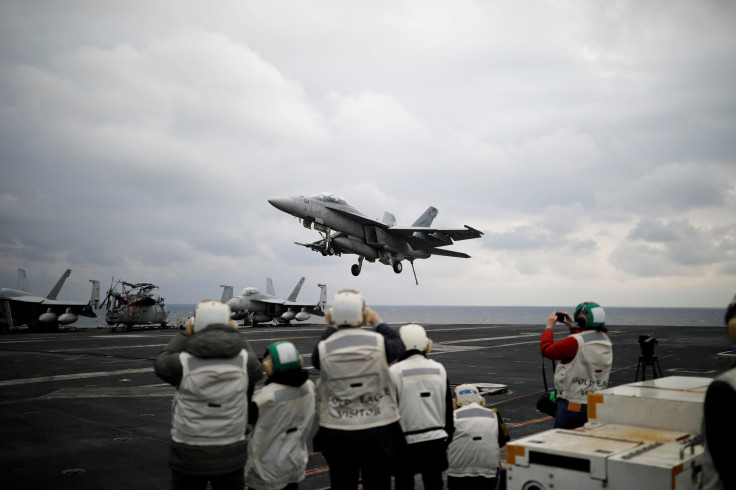Will The US Go To War With Kim Jong Un? North Korea Attack Unlikely, Seoul Says

Despite signs of escalating conflict around the Korean Peninsula, a South Korean official on Monday morning downplayed the likelihood of a direct confrontation, cautioning that "there’s no need to be worried."
"The U.S. has said it supports South Korea's policy on North Korea, and our government intends to solve all the problems peacefully," South Korean Ministry of Unification spokesman Lee Duck-Hang said during a press conference in Seoul Monday, according to the state-funded Yonhap news agency. "It is important to maintain peace and stability on the Korean Peninsula by resolving the issues of North Korea's nuclear weapons and missiles wisely."
Read: US Orders Aircraft Carrier Closer To Korean Peninsula
His comments followed the sudden deployment of the U.S. Navy’s Carl Vinson aircraft carrier and its associated group of strike vessels in the direction of the peninsula Sunday and what many considered an alarming display of U.S. military force in Syria Thursday night. In a statement, U.S. Pacific Command spokesman David Benham called the move “a prudent measure to maintain readiness and presence in the Western Pacific” and a way to “safeguard U.S. interests” in the region.
The subject of conflict with Pyongyang also surfaced in President Donald Trump’s talks with the leader of North Korea’s powerful neighbor, Chinese President Xi Jinping, over the weekend. In an interview with CBS Sunday, Secretary of State Rex Tillerson said the presidents had "extensive discussions around the dangerous situation in North Korea.
"President Xi clearly understands, and I think agrees, that the situation has intensified and has reached a certain level of threat that action has to be taken," Tillerson told "Face the Nation" host John Dickerson. "And, indeed, the Chinese, even themselves, have said that they do not believe the conditions are right today to engage in discussions with the government in Pyongyang… But I think there’s a shared view and no disagreement as to how dangerous the situation has become."
In contrast to Tillerson’s hope for diplomacy and discussion, experts expressed worries that the U.S. may act unilaterally, as in Syria last week.
Read: US, Japan And South Korea Working To Tackle Pyongyang Nuclear Threat
"If you are the North Korean leader, you say wow … I could be next," Daniel Goure, a former Pentagon official now serving as vice president of the Lexington Institute, an Arlington, Virginia-based think tank, told CNBC Sunday. "For them, I think the answer is straightforward—you can’t trust the Americans."
He added that the situation was "hugely near the tipping point" and could boil over into "a very intense, bloody war."
© Copyright IBTimes 2025. All rights reserved.






















